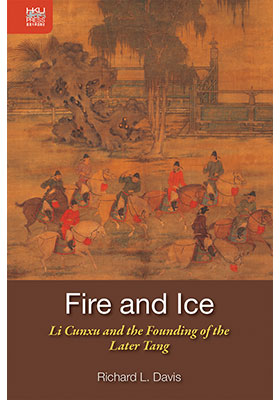Fire and Ice
Li Cunxu and the Founding of the Later Tang
(火與冰:李存勗與後唐的創始)
ISBN : 978-988-8208-97-5
August 2016
256 pages, 6″ x 9″, 5 color illus.; 1 b&w map
- HK$450.00
Ebooks
The Later Tang was the first of several ephemeral states created by the Shatuo Turks in tenth-century China and Li Cunxu, a martial genius, was its founder. In fifteen years, he turned a small satrapy on China’s periphery into a powerhouse capable of unifying the north and much of the southwest. He governed on the principle of racial inclusion and refused to set the ruling minority above the Chinese majority through special privileges. As someone highly literate and artistically gifted, Li Cunxu seemed uniquely capable of bridging rifts within his culturally diverse ruling elite. Unfortunately, he shared the sort of self-absorbed narcissism typical of dynastic founders, which contributed to his denouement merely three years into the reign.
The Later Tang dynasty presided over the epic changes that occasioned the Five Dynasties, when China evolved from a moribund medieval state dominated by hereditary elites to one organized around individual merit, an essential element of the nation-state. Critical to the evolution of governance in the tenth century was the rule of military magnates without vested interest in the old order.
“When empires fall, only the bold survive. Who will be the hero, and who the villain, in the eyes of history? Richard Davis takes us into the maelstrom of violence that was early tenth-century China in a lively account of an outstanding warrior king.” —T. H. Barrett, Professor Emeritus of East Asian History, SOAS, University of London
“Impressively researched, rich in detail, deeply erudite, this book introduces readers to a fascinating time when the Chinese and ‘barbarian’ worlds were intimately connected. Richard Davis deserves praise and gratitude for bringing history to life with such elegance and panache.” —Nicola Di Cosmo, Professor of East Asian History, Institute for Advanced Study, Princeton
“Richard Davis brings us into the fascinating but culturally complicated world of Li Cunxu, a military man as well as man of letters, for whom notions of duty and honor central to the warrior culture of the steppe coexisted with the political and literary values of the Tang.” —Patricia Ebrey, Williams Family Endowed Professor of History, University of Washington


